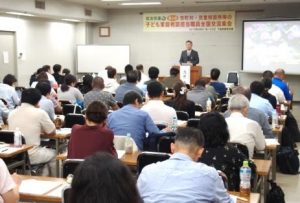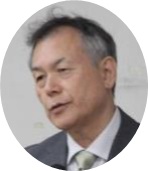Child/family counselors in municipalities actively discuss for eradication of child abuse cases
At their second national exchange meeting
 With child abuse becoming a growing social issue, Jichiroren’s social welfare section conducted its second exchange meeting on September 21 and 22 for municipal workers working as child/family counselors in cities, towns, and villages. The meeting took place in Chiba City, Chiba Prefecture, with 69 people participating.
With child abuse becoming a growing social issue, Jichiroren’s social welfare section conducted its second exchange meeting on September 21 and 22 for municipal workers working as child/family counselors in cities, towns, and villages. The meeting took place in Chiba City, Chiba Prefecture, with 69 people participating.
The social welfare section plans to investigate actual conditions of child/family counselors’ workplaces as well as to create and publish a proposal for them working hard in their local areas.
Jichiroren’s Vice President Takayanagi stated that while child abuse cases, poverty and social disparity are increasing, a drastic policy to eradicate their chain was urgent. “Let us work hard to change the present politics for everyone to live and work without anxiety and for children’s rights to be protected,” she said.
 In his keynote lecture, Rikkyo University Professor Emeritus Haruo Asai said that as a network of child consultation centers and other related facilities had protected lives and rights of children, efforts of workers in the front line should be recognized. He stressed, “What is needed is to establish conditions and environment to guarantee their special skills.”
In his keynote lecture, Rikkyo University Professor Emeritus Haruo Asai said that as a network of child consultation centers and other related facilities had protected lives and rights of children, efforts of workers in the front line should be recognized. He stressed, “What is needed is to establish conditions and environment to guarantee their special skills.”
Social welfare section manager Nishimura in her keynote proposal stated, “The number of child abuse-related consultations increases, and abused children’s deaths constantly occur. This is a serious social issue. In order to protect children’s lives and rights, let us launch a campaign in each workplace and community to demand that municipal governments build more child consultation centers and temporary shelters, improve special skills, and strengthen the present consultation and support systems.”
Reports by workers:
Chiba Prefectural Workers’ Union Vice President Katayama: Following a heartbreaking death of an abused child in Chiba Prefecture, our union submitted requests to the prefectural government. We need to listen to and understand the voices of workers in this field so that we can promote our demand for drastic improvement of the present systems as a call shared by all workers throughout of the prefectural offices.
Yokohama City worker Sase: Due to the growing number of child abuse cases, temporary shelters have to provide a space for more children than their capacity. However, new staff have not been recruited in those facilities, and they have a pile of difficult problems; those working on night shifts are unable to fulfill their tasks.
Participants on the second day split in three different workshops, which were joined by workers at child consultation centers and temporary shelters, municipal child/family counselors, caseworkers dealing with livelihood protection assistances, and welfare office staff. Childcare workers and nurses from temporary shelters talked about difficulties they face in their workplaces and tasks to reduce child abuse cases.
